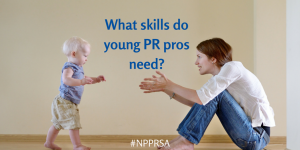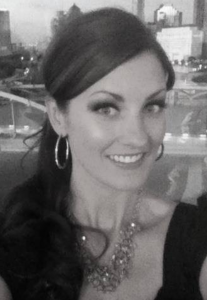 If you want to excel in the PR world, it’s time to think beyond the classroom.
If you want to excel in the PR world, it’s time to think beyond the classroom.
(Uh oh. I can already hear some angry rumblings from my former professors…)
I’ll admit, the skills you learn in your PR classes are vital. They’ve helped me understand strategy, ROI, media relations and much more.
(Phew. Now my next campus visit won’t be so awkward.)
But today’s PR pros need more than the basics. Even if you have a progressive professor teaching integrated PR, there’s still no way you can learn every single new marketing skill in one semester, or even four years.
With the way this PR world is changing, it’s just not humanly possible. To stay competitive in the job market you need to be:
- Constantly learning.
- Subscribing to podcasts.
- Reading blogs daily.
- Heck, even starting your own blog.
But don’t just take my word for it. To help answer the “What skills do young PR pros need” question, I’ve aggregated tips from some leading industry experts.
Understand the data – @johnsonhui
As a new PR pro, you’ll be heavily involved in reporting and measurement. But Johnson Hui of Edelman notes the most impressive employees can infer actionable insights from data – instead of just regurgitating numbers.
“PR professionals no longer simply grind data from press clips and media audits,” he says in Edelman’s blog post. “They need to be able to identify valuable data and tell evidence-based stories that can impact business decisions.”
Learn content marketing – @GiniDietrich
In her August 2014 post, Gini suggests doing content marketing for yourself to really understand how to use it on the job. Get started with a personal blog on Tumblr, WordPress or Blogger.
I started my own PR blog last year, and the insights I’ve gleaned have been tremendous. I researched and uncovered entirely new social and syndication tools to help my content get found, which, in turn, is used to help my clients amplify their own content.
Bonus tip: If you’re thinking to yourself “I have nothing to write about!” check out another Gini post on generating blog post ideas.
Speak publicly – confidently – @RachelAMiller
Sure, digital is an integral part of PR, but that doesn’t mean face-to-face communication is obsolete. Not by a long shot.
Rachel Miller of PR 20|20 notes that public speaking is the number one fear in the U.S. (Yes, number *one* above disgusting spiders or 50-legged silverfish bugs – my arch enemies). But, whether you’re sharing ideas during internal meetings or presenting a Q2 or annual plan to clients, public speaking is a necessity.
To beef up your public speaking skills – and calm those jitters – Rachel suggests finding local speech classes, clubs or even making toasts at family functions like weddings. (Look no further than Michael Scott for this inspiration.)
Look for trends, not just hits – @Julia_Sahin
In her post “10 things young PR pros need to STOP doing to get ahead,” Julia tells young PR pros to look for trends hidden within clients’ stories and industries. It’s easy to find client coverage and call it a day, but the PR pros who find the underlying trends are the PR pros who excel.
“Picking up the patterns and interests of reporters, publications and blogs and identifying opportunities is one of the most valuable skills in the industry,” she says in the post on Muckrack. “Start this practice early and you’ll be a real pro before you know it.”
Understand the media landscape – @allenmireles
Despite the ongoing PR changes, one traditional tactic remains integral to the industry: media relations. The third-party credibility is irreplaceable, says Allen.
But today’s media relations looks quite different than media relations 10 years ago. We now have blogger and influencer relations under that media umbrella. To stay updated on the media landscape, you must read, watch and listen to the news. And better yet, get your news from a variety of outlets.
This knowledge will get you far in the interview process and on the job.
PR is a constantly evolving industry. To get ahead of the pack, you’ll need to make sure these skills (plus those described in the subhead hyperlinks, which I strongly suggest reading) are part of your PR repertoire.
And now, it’s your turn: What must-have PR skills would you add to this list?
—
 Stephanie Vermillion is a senior account executive at Wordsworth Communications, a public relations agency in Cincinnati. She is the PRSA National New Professionals blog co-chair, and is on the PRSA Cincinnati Leadership Team. Connect with Stephanie on LinkedIn and Twitter (@SMVermillion).
Stephanie Vermillion is a senior account executive at Wordsworth Communications, a public relations agency in Cincinnati. She is the PRSA National New Professionals blog co-chair, and is on the PRSA Cincinnati Leadership Team. Connect with Stephanie on LinkedIn and Twitter (@SMVermillion).



